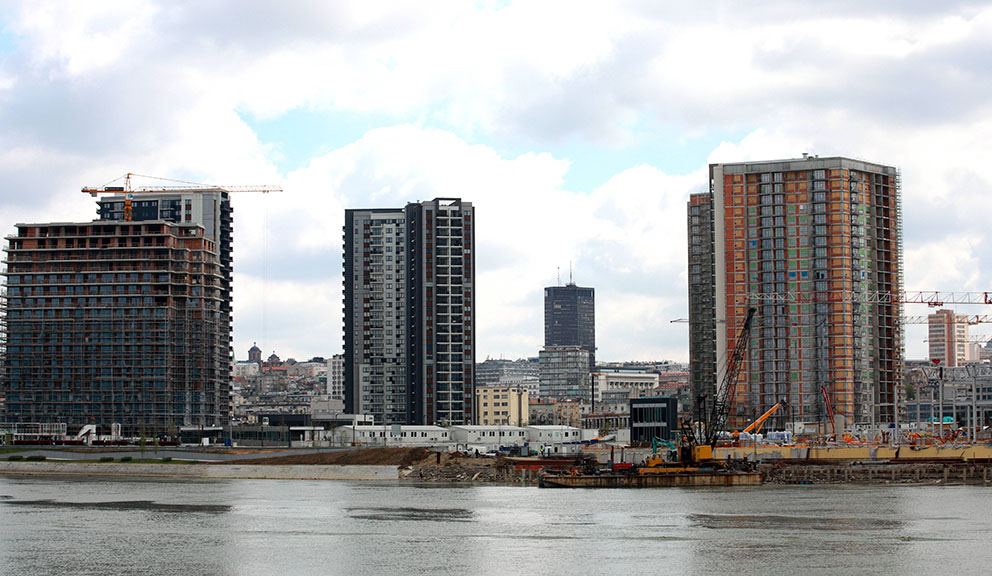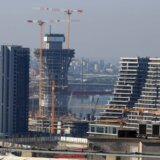 Foto: BETAPHOTO/MILOŠ MIŠKOV/DS
Foto: BETAPHOTO/MILOŠ MIŠKOV/DSIako je od formiranja preduzeća Beograd na vodi, koje u glavnom gradu Srbije gradi mondensko naselje na samoj obali reke Save, prošlo sedam godina, država kao njegov manjinski vlasnik još uvek nije ostvarila nikakav konkretan prihod, s obzirom da se sva zarada ulaže u investiciju.
For English version, please scroll down
O tome kada će do toga doći kao i o mnogim drugim spornim pitanjima vezanim za taj projekat nadležni u tom preduzeću, ali i u Vladi Srbije ćute.
Dok Srbija sa 32 odsto kapitala, do sad od projekta nije zaradila ništa, to ne važi i za partnera u tom poslu, firmu Belgrade Waterfront iz Ujedinjenih Arapskih Emirata koja poseduje 68 odsto udela u preduzeću. Do kraja godine srpska strana partneru iz Abu Dabija teba da vrati zajam u visini od 25 miliona evra, dok su ukupne obaveze prema firmi Eagle Hills, takođe firmi iz Emirata zaduženoj za razvoj projekta, 13,8 miliona evra.
Pored toga, još jedan od razloga zbog kojeg kritičari projekta izgradnje luksuzne četvrti u Beogradu dobijaju vetar u leđa kada tvrde da je nepovoljan za državu, jeste taj da firma u kojoj je država suvlasnik beleži gubitke. Naime, u prošloj godini preduzeće Beograd na vodi je zabeležilo neto gubitak u iznosu od 2,8 miliona evra. Takođe je ostvaren i manji prihod nego 2019. godine, pa je tako u prošloj on iznosio 32 miliona eva dok je pre dve godine bio znatno veći, oko 90 miliona evra.
Zbog čega je Beograd na vodi zabeležio gubitak u prošloj godini, zašto je u njoj ostvaren manji profit nego u 2019. kao i kada će konačno Republika Srbija početi da inkasira novac kao suvlasnik preduzeća, pokušali smo, pozvavši se na važeće propise koji medijma garantuju dobijanje dokumentovanih informacija, da saznamo od menadžmeta te firme. Međutim, u odgovoru na naš upit saopšteno nam je da je „kompanija Beograd na vodi” u većinskom privatnom vlasništvu, te stoga ne podleže odredbama Zakona o slobodnom pristupu informacijama od javnog značaja“.
Na naše dodatno pitanje da li postoji bilo koji razlog da nam ne bude odgovoreno na pitanja o radu preduzeća i podsećanja da je njegov manjinski vlasnik država, te da i po toj, ali i drugim normama, imaju obavezu da nam daju tražene podatke, nadležni u Beogradu na vodi su prećutali. Pitanja na ovu temu smo poslali i Vladi Srbije, ali nas njeni predstavnici nisu udostojili odgovora.
Aktivista Pokreta Ne davimo Beograd Radomir Lazović kaže za Danas da su gubici koje beleži Beograd na vodi logičan nastavak netransparentnog poslovanja tog preduzeća koje kršeći brojne zakonske norme gradi naselje na obali Save.
– Već uvidom u ugovor o izgradnji Beograda na vodi predstavnici našeg pokreta su se uverili u njegovu štetnost i nezakonitost. Od samog početka se moglo videti da ama baš nikakvu korist od izgradnje tog naselja neće imati ni država, ni Beograd ni građani. Shodno tome apsolutno ne čudi da su epilog svega i gubici koje preduzeće beleži. Reč je o projektu u koji je država uložila znatno više novca nego većinski partner u poslu a koliko ta cifra iznosi, kada se uračunaju svi skriveni troškovi izgradnje tog naselja, ne znaju ni nadležni u državi – kaže Lazović.
U prilog tezi koju iznosi govori podatak da su nadležni u Srbiji potpisali ugovor sa partnerom iz Ujedinjenih Arapskih Emirata iako njegove odredbe ne pružaju potrebne garancije da će ispuniti svoj deo obaveza. Ugovorom je predviđeno da investitor u izgradnju naselja Beograd na vodi nije u obavezi da uloži više od 150 miliona evra, od čega 20 miliona u formi kapitala. S druge strane Republika Srbija je navedena kao garant kredita u iznosu od najmanje 280 miliona evra. Iz toga se može videti da su ulaganja manjinskog partnera nesrazmerno veća od ulaganja stranog investitora. Stoga je logično postaviti pitanje, koji je interes Srbije da uđe u ovaj projekat zbog koga se znatno zadužuje?
– Odredbama ugovora o zajedničkom ulaganju određeno je da strateški partner ostvaruje profit, čak i u slučaju da je do raskida ugovora došlo njegovom krivicom, dok procenat od izgrađenog zemljišta zadržava. Nema dileme da je ugovor o izgradnji Beograda na vodi sačinjen na uštrb interesa države, da je novac građana korišćen za podršku sprovođenju tog projekta zarad koga su prekršeni domaće zakonodavstvo i ustavna rešenja. Upravo zbog svega toga Ne davimo Beograd je pokrenuo pravnu proceduru za raskidanje ugovora o izgradnji Beograda na vodi koji je u potpunosti podređen interesima stranog investitora i u svim segmentima poguban po državu. Razlog zbog koga vlast sprovodi ovaj štetni i nezakoniti projekat isključivo su nalazi u poslovnim interesima pojedinaca iz njenih redova – zaključuje naš sagovornik.
* Sadržaj je rezultat istraživanja sprovedenog u okviru projekta „Transparentnost učešća države u stranim investicionim projektima“. Stavovi izneti u tekstu su stavovi autora i ne izražavaju nužno stavove donatora
ENGLISH VERSION
A Project Aimed at Pursuing Personal Interests of the Government Officials
Although seven years have passed since the incorporation of the Belgrade Waterfront company, which has been building a fancy residential and commercial complex on the banks of the Sava River in the Serbian capital, the state as its minority owner has not yet generated any tangible income, since all earnings are invested back in the project. The company management and the Government of Serbia are silent about when this will happen, as well as about many other disputable issues related to the project.
While Serbia, as the minority owner of the Belgrade Waterfront with 32 percent of the capital, has not earned anything from the project so far, this does not apply to the foreign partner in the project, the Belgrade Waterfront Capital Investment from the United Arab Emirates, which owns 68 percent of the company. By the end of this year, Serbia has to repay the 25 million euros loan to the Abu Dhabi foreign partner, while the total liabilities to the Eagle Hills, another UAE company in charge of the project development, are 13.8 million euros.
Another argument, which gives the critics of the Belgrade luxury district development project the wind at their backs when they claim that it is unfavorable for the state, is that this company the state is the co-owner of records losses. Namely, last year, the Belgrade Waterfront company recorded a net loss in the amount of 2.8 million euros. The 2020 income was also lower than in 2019 – in the last year it amounted to 32 million euros, while two years ago it was significantly higher, about 90 million euros.
In line with the provisions of the current regulations that guarantee the media access to documented information, we contacted the management of the company and requested information on the reasons behind the loss recorded by the Belgrade Waterfront in 2020, as well as why it made less profit than in 2019, and when the Republic of Serbia, as the co-owner of the company, will finally start collecting money.
In response to our inquiry, we were informed that „the Belgrade Waterfront d.o.o. company is in majority private ownership, and therefore is not subject to the provisions of the Law on Free Access to Information of Public Importance.“ To our additional question whether there is any reason not to answer the questions about the company’s operations and a reminder that its minority owner is the state, and that according to that, but also other norms, they have the obligation to provide us with the requested information, the Belgrade Waterfront management kept silent. We also sent questions to this effect to the Government of Serbia, but its representatives did not give us any answer, either.
Radomir Lazović, an activist of the “Do Not Drown Belgrade Initiative”, told the Danas that the losses recorded by the Belgrade Waterfront are a logical continuation of the non-transparent operations of the company that has been building a luxury complex on the Sava Riverbank in violation of numerous legal norms.
– The harmfulness and illegality of the contract on the construction of the Belgrade Waterfront was clear to us as soon as the representatives of our movement analyzed this document. From the very beginning, it could be seen that neither the state, nor the City of Belgrade, nor the citizens will have any benefit from the construction of this complex. Accordingly, it is absolutely not surprising that the epilogue are the losses recorded by the Belgrade Waterfront Company. It is the project in which the state has invested significantly more money than the majority business partner. When all the hidden costs of building this complex are taken into account, the Serbian authorities do not know the exact amount of the state investment, either – Lazović says.
The fact that the authorities in Serbia have signed an agreement with a partner from the United Arab Emirates with no provisions that give the necessary guarantees that the foreign partner will fulfill their part of the obligations speaks in favor of the thesis Lazović presents. The agreement provides that the foreign investor in the construction of the Belgrade Waterfront complex is not obliged to invest more than 150 million euros, of which 20 million in the form of capital.
On the other hand, the Republic of Serbia is listed as the guarantor of the loan in the amount of at least 280 million euros. As it can be seen from this, the investments of the minority partner are disproportionately higher than the investments of the foreign investor. Therefore, it is logical to ask the question about the interest of Serbia to enter this project that makes it is significantly indebted.
– The provisions of the joint investment agreement stipulate that, even if the agreement is terminated by their fault, the strategic partner makes a profit by keeping the ownership over the percentage of the built land. There is no doubt that the agreement on the construction of Belgrade Waterfront development project is damaging for the state and that the Serbian taxpayers’ money is used to support the implementation of the project that violates the domestic legislation and the constitutional solutions. To this end, the “Do Not Drown Belgrade Initiative” has launched a legal procedure for terminating the Belgrade Waterfront development agreement, as it is fully subordinated to the interests of foreign investors and damaging for the state in all its segments. The only reason behind the Government’s implementation of this harmful and illegal project are the personal business interests of individuals from its ranks – our interlocutor concludes.
The content is the result of the research carried out within the project „Transparency of State Participation in Foreign Investment Projects“. The views expressed in the text are those of the authors and do not necessarily reflect the views of the donor.
Pratite nas na našoj Facebook i Instagram stranici, ali i na X nalogu. Pretplatite se na PDF izdanje lista Danas.












